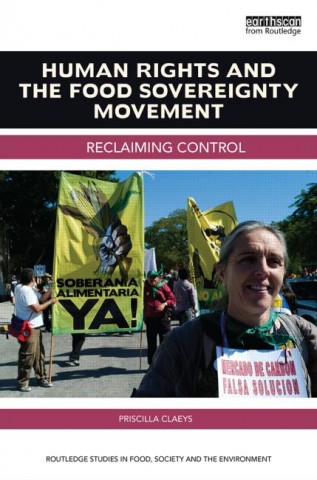Priscilla Claeys's "Human Rights and the Food Sovereignty Movement: Reclaiming Control" (2015) had some high level support and praise (Jun Borras, Olivier De Schutter, etc). The beginning of the abstract reads: "Our global food system is undergoing rapid change. Since the global food crisis of 2007-2008, a range of new issues have come to public attention, such as land grabbing, food prices volatility, agrofuels and climate change. Peasant social movements are trying to respond to these challenges by organizing from the local to the global to demand food sovereignty. As the transnational agrarian movement La Via Campesina celebrates its 20th anniversary, this book takes stock of the movement's achievements and reflects on challenges for the future. It provides an in-depth analysis of the movement's vision and strategies, and shows how it has contributed not only to the emergence of an alternative development paradigm but also of an alternative conception of human rights."
For those interested in La Via Campesina and the emergence of legal approaches (via human rights), this is a useful resource. With regard to international legal advocacy, Claey offers some interesting experiences (namely the role of: critical junctures, networks and allies, framing and re-problematizing):
- "Very few 'new rights' that emerge from the grassroots find their way onto the international human rights agenda (Bob 2010b). How did peasant organizations succeed in getting support for a process of negotiation of a Declaration on the Rights of Peasants at the UN? Three success factors are worth highlighting here. First, the global food crisis of 207-8 put the spotlight on smallholder farmers and gave peasant activities unprecedented access to international arenas to advance their demands." (p. 60)
- "Second, Via Campesina's demand for a new instrument was endorsed by a number of key actors who helped identify the 'legal opportunities' (Israel 2003) that could be seized at the HRC. The close ties, shared diagnosis and trust built between Via Campesina activists and human rights experts over the years played a central role in enabling them to move swiftly, and strategically. Without that endorsement, peasant activists would not have been able to advance their claims at the HRC." (p. 60)
- "Third, Indonesian peasant activists succeeded in framing their claims as human rights abuses, and in bringing their claims to the attention of peasant organizations in other countries, first in South-East Asia, then the world over. Most importantly, they chose not to depict their grievances as abuses of well-accepted human rights." (p. 61)
On the latter point, the author elaborates later in the text, one quote from that:
- "Diagnostic work is crucial because it enables 'system attributions' (McAdam et al. 1996, 9); it allows (potential) movement constituents to attribute everyday problems to global and structural mechanisms, and to overcome the 'fundamental attribution error', the tendency of people to explain their situation as a function of individual deficiencies rather than features of the system (Ross 1977). In the case of Via Campesina, diagnostic work has involved identifying injustices (appropriation of natural resources, forced rural migration, broken families and traditions, hunger, poverty and despair), victims (people of the land) and culprits (large financial institutions, neoliberal states, agribusiness and other transnational corporations)." (p. 82)

